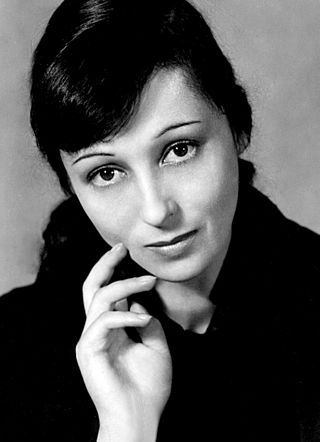
Luise Rainer was a German-born film actress. She was the first thespian to win multiple Academy Awards, and the first to win back-to-back; at the time of her death, thirteen days shy of her 105th birthday, she was the longest-lived Oscar recipient, a superlative that has not been exceeded, as of 2024.

Jane Powell was an American actress, singer, and dancer who appeared in Metro-Goldwyn-Mayer musicals in the 1940s and 50s. With her soprano voice and girl-next-door image, Powell appeared in films, television and on the stage, performing in the musicals A Date with Judy (1948), Royal Wedding (1951), Seven Brides for Seven Brothers (1954), and Hit the Deck (1955).

Vincente Minnelli was an American stage director and film director. For a career spanning over half a century, he is best known for his sophisticated innovation and artistry in musical films. As of 2024, six of his films have been selected for preservation in the United States National Film Registry.
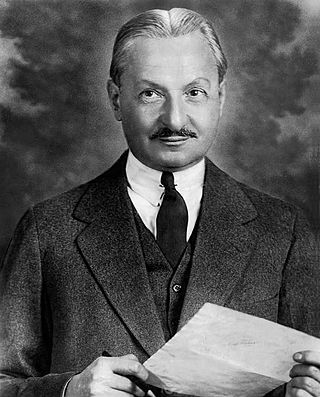
Florenz Edward Ziegfeld Jr. was an American Broadway impresario, notable for his series of theatrical revues, the Ziegfeld Follies (1907–1931), inspired by the Folies Bergère of Paris. He also produced the musical Show Boat. He was known as the "glorifier of the American girl". Ziegfeld is a member of the American Theater Hall of Fame.

Cannibal! The Musical is a 1993 American black comedy Western musical film directed, written, produced, co-scored by and starring Trey Parker in his directorial debut while studying at the University of Colorado at Boulder, before reaching fame with South Park alongside his friend Matt Stone who also stars in and produced the film. It is loosely based on the true story of Alfred Packer and the sordid details of the trip from Utah to Colorado that left his five fellow travelers dead and partially eaten. Trey Parker stars as Alferd Packer, with frequent collaborators Stone, Dian Bachar, and others playing the supporting roles.
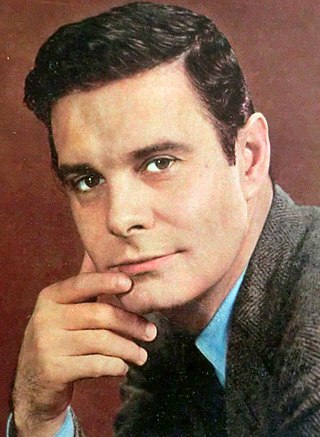
Louis Jourdan was a French film and television actor. He was known for his suave roles in several Hollywood films, including Alfred Hitchcock's The Paradine Case (1947), Letter from an Unknown Woman (1948), Gigi (1958), The Best of Everything (1959), The V.I.P.s (1963) and Octopussy (1983). He played Dracula in the 1977 BBC television production Count Dracula.

Fame is a 1980 American teen musical drama film directed by Alan Parker and written by Christopher Gore. Set in New York City, it chronicles the lives and hardships of students attending The High School of Performing Arts, from their auditions to their freshman, sophomore, junior, and senior years.

Sunset Boulevard is a sung-through musical with music by Andrew Lloyd Webber, and lyrics and libretto by Don Black and Christopher Hampton. It is based on the 1950 film of the same title.

Emmett Evan "Van" Heflin Jr. was an American theatre, radio, and film actor. He played mostly character parts over the course of his film career, but during the 1940s had a string of roles as a leading man. Heflin won the Academy Award for Best Supporting Actor for his performance in Johnny Eager (1942). He also had memorable roles in westerns such as Shane (1953), 3:10 to Yuma (1957), and Gunman's Walk (1958), and as a bomb man in the disaster film Airport (1970), his last screen role.

George Sidney was an American film director and producer who worked primarily at Metro-Goldwyn-Mayer. His work includes cult classics Bye Bye Birdie (1963) and Viva Las Vegas (1964). With an extensive background in acting, stage direction, film editing, and music, Sidney created many of post-war Hollywood's big budget musicals, such as Annie Get Your Gun (1950), Show Boat (1951), Kiss Me Kate (1953), Jupiter's Darling (1955), and Pal Joey (1957). He was also a president of the Screen Directors Guild for 16 years.

Evita is a 1996 American biographical musical drama film based on the 1976 concept album of the same name produced by Tim Rice and Andrew Lloyd Webber, which also inspired a 1978 musical. The film depicts the life of Eva Perón, detailing her beginnings, rise to fame, political career and death at the age of 33. Directed by Alan Parker, and written by Parker and Oliver Stone, Evita stars Madonna as Eva, Jonathan Pryce as Eva's husband Juan Perón, and Antonio Banderas as Ché, an everyman who acts as the film's narrator.

Marilyn Miller was one of the most popular Broadway musical stars of the 1920s and early 1930s. She was an accomplished tap dancer, singer and actress, and the combination of these talents endeared her to audiences. On stage, she usually played rags-to-riches Cinderella characters who lived happily ever after. She died suddenly from complications of nasal surgery at age 37.

Fame is a stage musical based on the 1980 musical film of the same name, with book by Jose Fernandez, music by Steve Margoshes and lyrics by Jacques Levy. Conceived and developed by David De Silva, it premiered in 1988 in Miami, Florida, and has spawned many stagings worldwide, including an Off-Broadway production at the Little Shubert Theatre from 2003 to 2004, under the title Fame on 42nd Street.
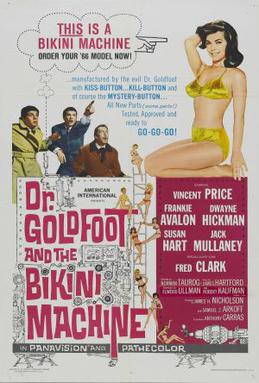
Dr. Goldfoot and the Bikini Machine is a 1965 Pathécolor comedy film directed by Norman Taurog and distributed by American International Pictures. Starring Vincent Price, Frankie Avalon, Dwayne Hickman, Susan Hart and Jack Mullaney, and featuring Fred Clark, the film is a parody of the then-popular spy trend, made using actors from AIP's beach party and Edgar Allan Poe films. The film was retitled Dr G. and the Bikini Machine in England due to a threatened lawsuit from Eon, holder of the rights to the James Bond series.

Jamie Parker is an English actor and singer. He is best known for his role as Harry Potter in the original cast for the West End play Harry Potter and the Cursed Child, for which he received a Laurence Olivier Award for Best Actor in a Leading Role in a Play and a WhatsOnStage Award for Best Actor in a Play. He also received a nomination for a Tony Award for Best Actor in a Leading Role in a Play as a member of the original Broadway version.
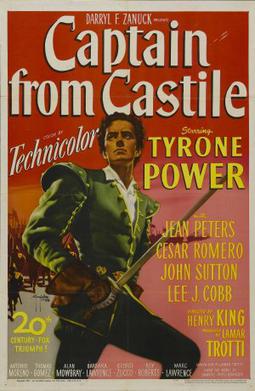
Captain from Castile is a 1947 American historical adventure film. It was released by 20th Century-Fox. Directed by Henry King, the Technicolor film stars Tyrone Power, Jean Peters, and Cesar Romero. Shot on location in Michoacán, Mexico, the film includes scenes of the Parícutin volcano, which was then erupting. Captain from Castile was the feature film debut of Jean Peters, who later married industrialist Howard Hughes, and of Mohawk actor Jay Silverheels, who later portrayed Tonto on the television series The Lone Ranger.

Shoot the Moon is a 1982 American drama film directed by Alan Parker, and written by Bo Goldman. It stars Albert Finney, Diane Keaton, Karen Allen, Peter Weller, and Dana Hill. Set in Marin County, California, the film follows George (Finney) and Faith Dunlap (Keaton), whose deteriorating marriage, separation and love affairs devastate their four children. The title of the film alludes to an accounting rule known in English as "shooting the moon" in the scored card game hearts.
Michael A. Hoey was a British author and film and television writer, director, and producer. He was the son of Dennis Hoey, who portrayed Inspector Lestrade in Universal's Sherlock Holmes series.
Films made in the 1970s featuring the character of James Bond included Diamonds Are Forever, Live and Let Die, The Man with the Golden Gun, The Spy Who Loved Me, and Moonraker.
Christopher "Chris" Gore (1944–1988) was an American screenwriter, playwright, and lyricist. Gore is best known for writing the screenplay for the 1980 musical film Fame, for which he received a nomination for the Academy Award for Best Original Screenplay.



















